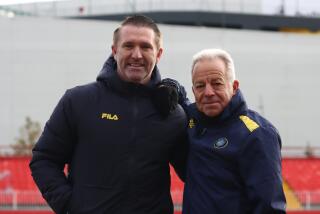World Cup lacked good soccer
- Share via
From Johannesburg, South Africa — The book has been closed on South Africa 2010.
The last page was merely turned without fanfare as Africa’s first World Cup moved from being a live event to a historic one.
FOR THE RECORD:
World Cup games: An article in Tuesday’s Sports section about the quality of play in the World Cup said the European Championship would expand to a 24-team event in 2012. The expansion is set for 2016. —
As always, the day after the final was anticlimactic. South Africa’s newspapers on Monday couldn’t stop congratulating themselves and the nation for putting on what everyone said was a hugely successful tournament.
Few visitors heading for the airport would have disagreed. Everything that was supposed to go wrong, went right. Except the soccer, that is. This was not a vintage World Cup, not by a long shot.
True, there were memorable moments, memorable goals, memorable plays, but there was not one game among the 64 played over the last month that belongs in a time capsule.
The soccer, not the country, was the letdown.
In the end, the team that deserved to win did so, and Spain can celebrate long and loud in the wake of its 1-0 victory over the Netherlands in Sunday night’s final. But would you want to watch that game again?
As England’s Independent newspaper summed it up in a headline: “Well organized, nice people . . . shame about the football.”
From a sportswriter’s perspective, South Africa was not so much eye-opening as mildly disappointing
It would have been satisfying to report on the lions that prowled around outside our camp near Polokwane, or on the wildebeest stampede that prevented us reaching a game in Rustenburg, or the colleague who was swallowed whole while trying to ford a rain-swollen river.
Sadly, none of that happened. South Africa in 2010 is not South Africa in 1910. This is a modern African country with all that that implies. In other words, some thrive, many survive. In Johannesburg, for instance, there is a swank Sandton area cheek and jowl next to rank Alexandra Township.
The wealth and poverty contrasts in South Africa are stark, and the country’s leaders and citizens are now left to ponder whether World Cup 2010 was all worth the cost and effort.
Meanwhile, the trudge from game to game over the last month seemed endless. With each game came the hope that we would see something special, something different, something to write home about.
That moment never arrived.
Yes, the meltdown of former champions England and France and of defending champion Italy sparked some interest. Yes, the daily diatribes from Argentina Coach Diego Maradona were mildly amusing. Yes, Argentina, Brazil and Germany thrilled on occasion.
But no, the tournament held no defining moment. Commercialism has robbed the World Cup of its awe. It might, in fact, have robbed the sport as a whole of its attraction.
In the back of many minds was the disturbing idea that the players were merely going through the motions, and that their real allegiance lay with the club teams that have turned them into pampered and coddled millionaires.
There are those who argue that the annual European Champions League has surpassed the World Cup as the sport’s premier event. Since it features the best clubs in the world, and the best clubs have the best players, a solid argument can be made.
Similarly, there are others who claim that when the European Championship, which is for national teams, becomes a 24-team event in 2012 with Poland and Ukraine as co-hosts, it also will overtake the World Cup. We shall see.
Such Eurocentric views annoy those in other parts of the world. Just listen to sports editor Mninawa Ntloko, writing in Monday’s edition of South African publication Business Day:
“FIFA’s mobile money-making scheme will now move on to Brazil. It will now be their turn to put up with the constant negativity from bitter European media who wish the tournament was staged on their shores every four years.”
Brazil is the next World Cup host and its president, Luiz Inacio Lula da Silva, was in South Africa last week to begin banging the drum for 2014. Lula’s rhetoric was pure politics.
“The success of our African brothers represents a tremendous challenge to the Brazilian people,” he said. “We are learning from them to ensure that the 2014 World Cup will be an event that is even better than this one.”
On and on Lula went, but Brazil 2014 is four years distant. Everyone knows that the same problems of infrastructure, transportation, crime, lack of stadia and so on, have to be dealt with, and quickly.
The hope, however, is that even if Brazil struggles with such problems, at least it will get the soccer right.







